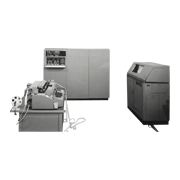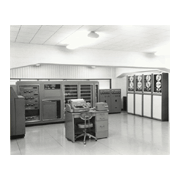The OKITAC5090 was the first machine in Japan to use magnetic core memory for all internal memory. It was completed in 1961, but the OKITAC5080 was developed as a prototype in the previous year. The OKITAC5080 used magnetic core memory for the main memory unit, where almost all Japanese models of the time used magnetic drums, and it was a transistor-based computer which employed a static circuit system. Oki electric industry stopped multiplexing input/output devices and switched to a series system, simplified circuits using the high speed performance of magnetic cores, and there by achieved higher speed and reliability. The results of development of the OKITAC5080 were reflected in the OKITAC5090.
For the OKITAC5090, the A Model was completed first in 1961, and from then until 1963, 6 models were marketed as a series, and became a best-seller for that time. The original A Model used magnetic core memory, and did not use buffer memory at interfaces with input/output devices, so it was possible to connect high-speed input/output devices with good efficiency. Main memory was 4,096 words. Numeric words were decimal, 12 digits/word. Instruction words were the pair-order type with 2 instructions/word. Operation speed was 0.4msec. As input/output devices, the system was equipped with an electric typewriter, a photoelectric paper tape reader, and a high-speed line printer.
The Models A~D became best sellers primarily at Universities, which were a big market at that time. The reasons usually given for this are: high-speed processing using magnetic cores, an easy-to-use instruction set, numerous input/output devices, and especially the fact that a high-speed line printer was connected. In using the magnetic core memory, a great deal was owed to the research results of Toru Motooka of Tokyo University.
| OKITAC 5080 |
OKITAC5090 Series | |||||||
|---|---|---|---|---|---|---|---|---|
| A Model | B Model | C Model | D Model | M Model | H Model | |||
| Announ- cement date |
1961 | May 1961 | 1962 | 1963 | ||||
| Control system | Built-in program system | |||||||
| Word length | 1 word = 42bits | 1 word = 50bits | 1 word = 42bits | |||||
| Numerical | Decimal, Sign 1bit + 10 digits + Parity 1bit sign |
Decimal, Sign 1bit + 12 digits + Parity 1 bit |
Decimal, Sign 1bit + 12 digits + Parity 1 bit Fixed point numbers, Sign 1bit + 48bits + Parity 1bit Floating point numbers, Sign 1bit + Characte- ristic 8bits + Mantissa 40bits + Parity 1bit |
Only binary number represe- ntation Fixed point numbers, Sign 1bit + 41bits Floating point numbers, Sign 1bit + Characte- ristic 9bits + Mantissa 32bits |
||||
| Number of instructions | 22 | 52 | 58 | 58 | 64 | 85 | 199 | |
| Instruction format | 2 address system | 1 and 1/2 address system, 1 word 2 instructions |
Same as at left + Auxiliary word | |||||
| Index | 1, 4 digits | 1 | 15, 1 word length | |||||
| Operation speed | Addition/ subtraction 0.5ms Multiplication 15ms Division 17ms |
Fixed point number Addition/subtraction 0.4ms Multiplication 5.5ms Division 10.0ms Floating point number Addition/ subtraction 0.7~1.4ms Multiplication 4.9ms Division 8.9ms |
Fixed point Addition/ subtraction 30µs Floating point Addition/ subtractio 85µs |
|||||
| Basic elements | Transistors, Diodes | |||||||
| Memory unit | Magnetic core 1000 words |
Magnetic core 1000 words, 2000 words, 4000 words |
Magnetic core 4,000 words, 8,000 words |
Magnetic core 8,192 words ~ 16,384 words |
||||
| Input/ Output devices |
PTR | 2 | 1 | 2 | 1 | 2 | 2 | 2 |
| LP | 1 | 1 | 1 | 1 | 1 | 2 | 2 | |
| ET | 2 | 1 | 1 | 1 | 1 | 1 | 2 | |
| CR | 1 | 1 | 1 | 2 | ||||
| CP | 1 | 1 | 1 | 2 | ||||
| MT | 1-6 | 1-6 | 1-10 | 1-45 | ||||
| Other | Power consumption Main unit: 250W |
Magnetic drum (1-10 units) | Equipped with magnetic drum and magnetic disk | |||||



